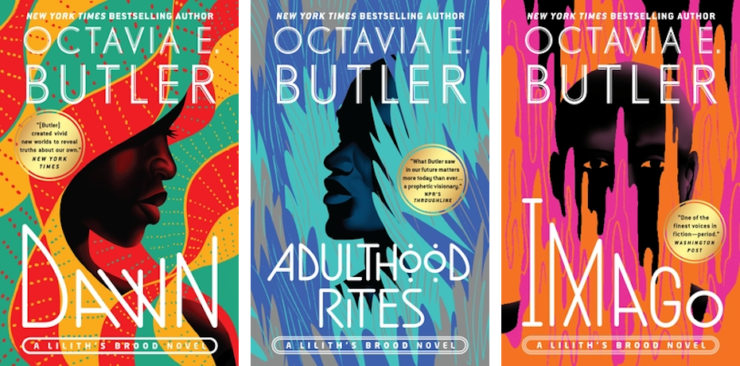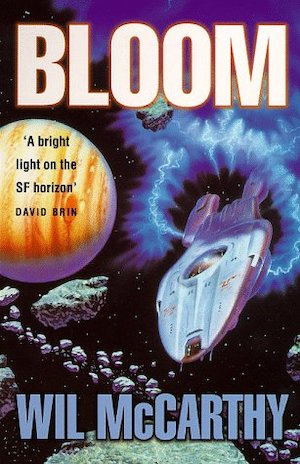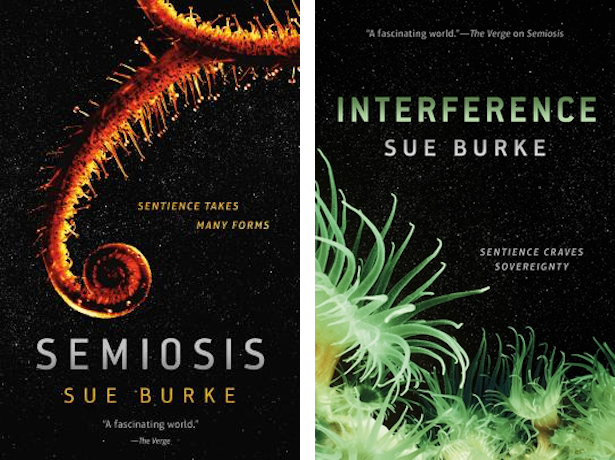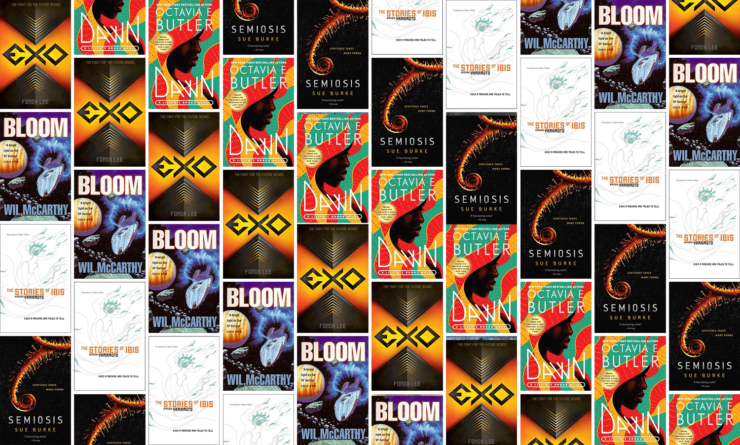Humans are accustomed to seeing ourselves as the rulers of creation, apex beings with the right to rearrange the world for our convenience. For many people this is a central tenet of faith, little challenged by the occasional pandemic or environmental collapse. SF authors, however, are willing to consider that this just might be wrong. Many works have explored what it would be like if we were one day to discover that superior entities now ruled our world. Humans would be domestic animals, mere puppies of Terra…
Consider the following five works that challenge human supremacy.
Lilith’s Brood (Dawn, 1987; Adulthood Rites, 1988; Imago, 1989) by Octavia Butler

Not content to develop weapons of mass destruction and the means by which they could be delivered, humanity then proceeded to demonstrate their capacity to eliminate life on Earth by using those weapons. They were successful beyond their wildest nightmares. There are but a handful of survivors, who see no possible future. All they can do is wait for death.
One such survivor, Lilith Iyapo, is astounded to wake two and a half centuries later on an alien spacecraft. The Oankali happened upon dying Earth. They just happen to be masters of biotechnology. While quite aware of humanity’s inherent shortcomings, the Oankali nevertheless believe something of value can be salvaged. The surviving humans are returned to a restored Earth as part of the grand Oankali design.
Humans soon learn that while the Oankali serve a greater good, it is an alien greater good. Humanity has been saved…for now. This momentary respite is a temporary measure to grant the time to use humanity’s raw material to create something new and (as far as the Oankali are concerned, far superior). Once the hybrids are created, there will be no need for the inherently suicidal human species.
***
Bloom (1998) by Wil McCarthy

Visionary humans created technogenic life, which they dubbed Mycora. Then they lost control of it. Mycora escaped the labs and factories, then spread across the Earth and the inner Solar System. Humans lucky enough to reach regions too cold to support Mycora—the Asteroid Belt, Jupiter’s moons—survived. Everyone and everything else was consumed in the Bloom.
In 2106, journalist Strasheim is recruited to document the voyage of an explorer ship, the Pasteur. It will undertake a survey of the Inner System, now consumed by the Bloom. The ship has been constructed with advanced defenses that should keep Mycora at bay…but it is nonetheless an extremely hazardous mission.
What Strasheim doesn’t know (but eventually learns) is that the mission’s true purpose is far different from that given as cover story.
***
The Stories of Ibis (2010) by Hiroshi Yamamoto

If asked, Storyteller would explain that there is a simple reason humans have been reduced to a few million survivors while robots rule the world. The robots overthrew humanity. The current crop of humans must descend from survivors of a terrible vengeance. Facts that would undermine this version of history (such as the odd robot custom of shipping food they do not need by means easily hijacked by humans) are best ignored.
Captured by the ancient robot Ibis, Storyteller could be forgiven for expecting the worst. But Ibis has no interest in mistreating a member of an endangered species. Instead, the robot simply wants an audience for a series of tales, which taken together will explain how Ibis and her artificial companions went from servants to Earth’s rulers.
***
Exo (Exo, 2017; Cross Fire, 2018) by Fonda Lee

Concerned for Earth’s well-being should other, less well-meaning aliens discover and conquer it, the alien zhree, having discovered Earth, proceeded to conquer it. Despite mass casualties due to humanity’s misguided reluctance to be absorbed as a minor Mur Commonwealth colony world, everyone agrees that in the long run, conquest was the best thing that could have happened to Earth. At least, Earth’s Mur overlords agree that it was, and isn’t that what matters?
West America’s Prime Liaison Reyes is loyal to the Mur Commonwealth. So is Reyes’ cybernetically enhanced son Donovan. This is not merely because of the status and power the Mur confer on loyal colonials. It is because the Mur Commonwealth is all that stands between Earth and the Mur Commonwealth’s merciless, rapacious Rii cousins. Better Mur Commonwealth paternalism than to be consumed as raw materials for the Rii.
Nevertheless, some humans persist in pursuing Terran independence, a struggle into which Donovan is quite reluctantly dragged. The effort seems Quixotic. Should the Terrans somehow succeed, the results could be apocalyptic.
***
Semiosis (Semiosis, 2018; Interference, 2019) by Sue Burke

Frustrated with an Earth seemingly unwilling to deal with social decay, pollution, destructive industrial policies, and endemic conflict, a shipload of idealists set out for HIP 30756. Many decades later they rouse from hibernation to discover they are in orbit around HIP 30815. Having little choice in matter, they settle HIP 30815’s garden world, which they name Pax.
Had the settlers had the time for a comprehensive survey, they might have discovered before it was too late that while Pax does not have humanoid overlords, it does have overlords of a kind humans are ill-equipped to recognize. At least at first. After it is far too late, the dwindling human population belatedly comprehends that they have become pawns in a war between two factions of Pax’s true masters. Nothing for it but to choose a patron and hope for the best. And try not to think about what would happen if one of Pax’s rulers made its way to Earth….
***
Many, many authors have tried their hand at this subgenre. I can think of dozens of examples offhand and I am sure you can think of hundreds more. The comments are, as ever, below.
In the words of Wikipedia editor TexasAndroid, prolific book reviewer and perennial Darwin Award nominee James Davis Nicoll is of “questionable notability.” His work has appeared in Publishers Weekly and Romantic Times as well as on his own websites, James Nicoll Reviews and the Aurora finalist Young People Read Old SFF (where he is assisted by editor Karen Lofstrom and web person Adrienne L. Travis). He is a four-time finalist for the Best Fan Writer Hugo Award and is surprisingly flammable.











Glynn Stewart’s Duchy of Terra Universe is another ‘paternalistic aliens conquer Earth to protect us from their enemies’. There, it actually does turn out to be a good thing – Earth becomes a highly prized and productive member of the alien’s sovereignty. He’s done in the universe – nine books in three nicely self-contained trilogies.
Thomas Disch’s The Puppies of Terra (1979) has energy beings ruling over humans, who they see as pets (thus the title) and who control humans through telepathic Leashes — humans can think for themselves but their Master can hear everything they think and can punish them mentally. Act 1 follows our protagonist in captivity; Act 2 has him escaping by accident, then meeting and being won over by the rebels; Act 3 has the rebels finding a surprising Achilles Heel for the aliens, and flushing them from Earth. I read this book in high school and tracked it down again 20 years later after rasfw story-id’d it for me.
1: Given that Stewart is a local author, I really need to find the time to review at least one of his books….
John W. Campbell, Jr. published Cloak of Aesir in 1952, a collection of short stories. The title story had something to do with a small band of humans overthrowing their alien overlords by using super science. I honestly don’t remember much more and I don’t think you could pay me to read it again.
There are lots more, of course … This Immortal, by Roger Zelazny; John Varley’s Eight Worlds stories; Robert Silverberg’s The Alien Years; Rick Wilber’s Alien Morning and Alien Day; Avram Davidson’s The Kar-Chee Reign; Geo. Alec Effinger’s “The Aliens who Knew, I Mean, Everything” …
4: Someone did pay me to reread it. At least, I have a report dated May 21, 2003 for A NEW DAWN: THE COMPLETE DON A. STUART STORIES…
Battlefield Earth. Sure, Ron Hubbard wrote it but I’ve read SF that was a whole lot worse. Or maybe it doesn’t count if the humans rise up and defeat their new masters? (Otherwise I guess you could include Planet of the Apes).
Also notable is the entire series setting for Walter Jon Williams’ Praxis series. The alien Shaa conquered everything and everyone, including humanity, and built an empire—then got bored and succumbed to species extinction, leaving their imperial subjects behind. Including numerous sentient species who don’t necessarily see eye to eye on the question of who will suceed the Shaa as Master Race …
Little Black Rule: there are probably ethnic Solomani in the rimward portions of the Third Imperium who feel this way.
I have an unfortunately dim memory of a funny book from the 1950s or 1960s, possibly called The Usans in which earth is conquered by advanced but not very bright aliens, who then are subverted by the citizens of the USA.
John Christopher’s Tripods trilogy.
I seem to recall a minor Poul Anderson (“War of Two Worlds”?)
Arthur C. Clarke’s Childhoods End
I assume Heinlein’s The Puppetmasters qualifies.
Turtledove’s Worldwar series might be excluded because the Race did not complete their conquest.
Worldwar is an example of a thriving subgenre about how humans resist invasion thanks to some special attribute, which is generally something like our inventiveness, diversity, or martial prowess but almost never because humans have a phenomenal buttock to body mass ratio.
Jo Zebedee’s Inish Carraig is a good recent example.
Then there’s William Tenn’s “The Liberation of Earth”… is that one instance, or two, or several?
When I was young, I read the Tripod books by John Christopher. The White Mountain, The City of Gold and Lead, and The Pool of Fire. He later published When the Tripods Came. Looking back, they were YA books before that was a recognized category(1960s?).
Stephen Baxter’s Xeelee series qualifies.
Do Mira Grant’s sentient tapeworms count?
If you’re looking at Stewart’s books, the ONSET series is a nice take on urban fantasy, if for nothing else then the gag in the last of the four books when The Masquerade is broken and governments all over the world are falling left, right and center, or are otherwise on the verge of collapse as outraged (and terrified) populations find out what has been hidden from them, one of the noted exceptions is Canada. The department responsible for paranormal affairs sends a polite memo to Parliament promising a complete and transparent explanation of what is going on, but might it have some time to deal with the current demonic invasion of the United States first?
Someone mentioned Tom Disch’s early novel, The Puppies of Terra/Mankind Under the Leash. But even more so his first novel, The Genocides, in which Earth has been conquered by aliens who, far from merely ruling us, don’t even care bout us; we are completely irrelevant to what they are doing to Earth.
@12. You need Wombats for that.
@17 I think your memory was off. The Canadian announcement was fairly early in the book, and doesn’t mention the USA. I still find it to be quintessentially Canadian.
@@@@@ 10 I seem to remember linking to a story rather like that, aliens decide to begin their invasion of earth with the great plains of the US. Coming from a planet of equable climate and no weather to speak of they dismiss stories of ‘Tornados’ as folklore. Eek! Nor are they prepared for snow.
It’s long past midnight where I am so I hope my tired brain will be forgiven to have focused on the “Humans Are No Longer in Charge” bit while ignoring the “Alien Overlords” part.
Anyway, I immediately thought of Jack Williamson’s story “With Folded Hands”. This one’s a classic, published nearly 75 years ago now, but it is so good.
As I’ve indicated, it doesn’t really belong here because it’s not about alien overlords but I’ll mention it anyway because it deserves to be read by those who have never heard about it.
21
That’s one of Christopher Anvil’s. He wrote several along that line, and the one you remember is “The Gentle Earth”.
I, for one, welcome our new alien overlords . . .
Thanks. PJ Evans, That was it!
William Tenn’s The Men in the Walls.
The complete opening paragraph runs: Mankind consisted of 128 people.
While primarily humour, Walter Jon WIlliams’ Drake Majistral series, starting with _Ten Points for Style_ has humans absorbed into an alien empire as a relatively minor world.
not a great novel, but on the theme: Mark Sumner’s “On Whetsday”. Humans are down to…not many.
The Last Legends of Earth. Humans are resurrected from fragments of DNA billions of years after the sun incinerated the earth and used as bait in a war against aliens that feed on hormones secreted when the host sentient is in pain.
The story covers thousands of years of the new human civilization with the war between the two alien races as background.
H.M. Hoover’s The Delikon has an obstreperous humanity conquered by the titular aliens and reduced to a non-technological existence. Eventually they conclude that humanity cannot become civilized and will never be a threat again, and withdraw- completely coincidentally during a human rebellion that strands a Delicon tutor and her charges behind enemy lines…
From the movies:
The alternate ending of “Pet Shop of Horror” is worth looking at for when Audrey 2 isnt easily disposed of…
The recent Godzilla King of Monsters basically concludes that humanity is Godzilla’s pet.
@26: It’s available at Project Gutenberg and man is it grim.
@28: I read it on the author’s blog and liked the old-school storytelling rhythm. And the constant rearranging of what the protagonist thinks he knows.
One could argue that this concept underlies much of both Stargate SG-1 and Stargate Atlantis.
Not aliens, but robots – Sea of Rust by C Robert Cargill. It’s basically a western – all the humans are dead, the robots won.
The Cyberiad by Stanisław Lem might at least peripherally qualify? Though its protagonists are not squishy humans, those do still exist and pop up in some of the stories.
The WondLa trilogy by Tony DiTerlizzi has Earth being terraformed/colonized by a multi-species alien civilization while humans are sealed inside vaults waiting for the planet’s post-apocalyptic ecology to re-seed itself (in their defense, the aliens thought the planet was abandoned); by the time the humans emerge, the planet is no longer theirs.
Similar to @30’s example Netflix’s Godzilla: Planet of Monsters trilogy takes this thought to its 20,000-year conclusion; an interstellar colony ship returns to Earth to find a completely new ecology. The trilogy ends with the extermination of most of the returnees, leaving a small population to interbreed with the new humanoid species that have evolved on Godzilla-Earth.
Of course, the third “era” of Robotech (based on Genesis Climber Mospeada) is based on this idea; after a string of interstellar wars, the Invid succeeded where the Zentraedi and the Robotech Masters failed. Earth belongs to the Invid Regis, and humans are basically particularly clever vermin –tolerated as long as they stay away from the protoculture farms and don’t own any technology or energy weapons (like the kind used by the rag-tag resistance).
IIRC, in Gordon R. Dickson’s Wolfling, not only is Earth a backwater but the alien overlords are in fact alien (unlike, e.g., “Call Him Lord”, where the empire that tests its potential heirs on Earth is fully human); however, since this is a Dickson novel the eponymous Earthman turns out to be better than the aliens at being an overlord. (Crude explanation — I haven’t tried rereading this in decades.)
Wayne Barlow’s masterpiece Expedition: Being an Account in Words and Artwork of the 2358 A.D. Voyage to Darwin IV is sorta in this genre, in the background. Benevolent, superior aliens have taken pity on polluted, devastated humanity and eventually endow the expedition to Darwin IV.
36: To quote from my review of Wolfling:
Erick Frank Russell’s Sinister Barrier (1939) describes a future(sort of*) in which humans are no longer in charge.
*It takes place in 2015.
Since no-one has mentioned this as an addition to the list: Keith Laumer’s “The Monitors” – a quirky little book (and even quirkier film in 1969) – old and forgotten, “B” list perhaps, but it was a favorite and I think well worth a second look. And, next, hesitantly, I offer “To Serve Man” yeah, the Twilight Zone episode, and the original short story by Damon Knight … I mean, it fits, right?
Just a word of warning – those Octavia Butler books have a lot of sexual assault in them. Enough that it triggered me, and I’m not easily triggered.
In the Millenia spanning Xeelee series by Stephen Baxter, Earth is twice invaded and occupied by aliens for a few hundred years. After humans managed to kick the alien overlords out again, humanity decided “never again” and became the second most powerful civilization in the galaxy (by any means necessary), even going against the Xeelee itself. Which only went well as long as the Xeelee didn’t care. After they did…
Another example I enjoyed a long time ago was Mallworld by Somtov Sucharitkul. There, alien overlords gave the humans great new technology and leave them mostly to their own devices, but also close off the solar system with an impenetrable force field until they think humans are fit to join the other galactic civilizations.
Also by Gordon R. Dickson from the ’80s, Way of the Pilgrim. Humans conquered by alien Aalaag, who treat and refer to them as cattle.
Here’s another recommendation for Stewart’s series’. Starship’s Mage is surprisingly enjoyable as well – they’re all far more fun than they “should” be for the typical high-volume Kindle Unlimited author.
@31: He extended it into the novel Of Men And Monsters, which is… viciously iconoclastic about our image of ourselves, I think is the best way to put it.
Timothy Zahn’s _Blackcollar_ books seem to fit.
I’m thinking of David Brin’s Startide Rising et al., the Uplift Wars series. Humans haven’t been conquered, no. But they’re clearly not in charge–they’re small potatoes who think of themselves as underdogs while most of the galaxy thinks of them as unimportant or has never heard of them, although some who do know about them do have them upgraded to vexing irritant and even source of cognitive dissonance.
@10: I think maybe you’re thinking of “Pandora’s Planet” by Christopher Anvil. The aliens are a tad thick . . . but what I find interesting is that they are more, um, solid deep down than humans. It’s funny, and pretty well written. There’s more satire on humans than on the aliens there.
To be strictly accurate, one cannot consider William Tenn’s Of Men and Monsters (The Men in the Walls) as being a case of alien overlords, Those aliens were so large that they did not so much lord over humans as ignore them completely, as men were no more than harmless pests living in the walls. Yes, this may be nit-picking, yet it is also valid.
I don’t believe that anyone has brought up the TV show (I think they even rebooted it) “V” – where aliens bypass the low gravity iceball Europa in favor of getting water from Earth (along with random bits of protein…).
CJ Cherryh Chanur novels have the humans mostly as an afterthought (except for one human)
And.. Hitchhikers guide to the Galaxy seems to fit in here as well….
Terra Nullius by Claire G. Coleman is worth a mention. Great book by an Aboriginal author.
The Madness Season by C. S. Freidman. Shows what could happen to humans and Earth hundreds of years after an invasion. The Tyr culled all humans with traits that might lead them to rebel against the Tyr conquest. Really original ideas as far as the unexpected nature of the lead character, the nature of the alien species, and how the story is resolved. Not the expected heroic rebellion story, comes at it from a different perspective. Something I re-read every few years.
#29
Read that very good read, very different.
also the TV Show Defiance sort of quali
Regarding William Tenn’s novel Of Men and Monsters, I discovered that many years ago Jo Walton has posted a review of this novel here at tor!
@54 Jens
That is a great read.
Harry Turtledove’s Lizardwar books (INTO THE BALANCE, etc.) show humans innovating their way out of alien occupation. Best line, when the lizards discover a Fun Addictive Substance on our planet. Fleetlord Atvar: “We will just order them to stop”.
(followed by five minutes of hysterical laughter by most anyone who reads the book).
On a lighter note: https://whatever.scalzi.com/2010/10/02/when-the-yogurt-took-over-a-short-story/
Pandora’s Planet by Christopher Anvil is a charming book about the immense galactic empire (alien) finding the planet Terra which it decides to incorporate. There is a catch though. The average human is far more intelligent than the average alien and the invasion is met by setback after setback. Finally, by overwhelming force, they succeed. And that is when the real troubles begins. When humans are spreading through the empire, enthusiastically forming planets after their individual ideas and creating chaos in general.
Charlie Stross’ Dead Lies Dreaming, where the New Management, such as the Black Pharaoh, have taken over national governments.
One of the flaws of “Golden Age” sf enforced by Campbell was [white] human supremacy. I’ve read this is one of the reasons Asimov, whose ethnic history was more one of being marginalized and persecuted than conquering and ruling, rarely, if ever, used aliens.
C.J. Cherryh’s “Hunter of Worlds” features aliens that are very much the dominant species…The Iduve evolved from predator, rather than omnivore stock, who choose to be civilized, mostly. Their instincts have been controlled by tradition and ritual, limiting the damage that such could wreak They have individuals of the other species that they keep as essentially servants, many of which have come to see as such as an advantage, as the Iduve protect and take care of that which they see as their own, and are in general content in their captivity. The iduve find their presence soothing, as they remind them to temper some of their instincts, and provide an outlet for some others. To harm one, is seen as grotesque behavior, and results in a loss of face and status among the clan. Having been absent from the local galactic area for centuries, the return of one clan sends the free population of the formerly associated alien species into a panic, causing them to butt heads with some other new arrivals, humans…And, having been uplifted technologically by the iduve, the wars are not going well for the humans, till one is captured, and forcibly mind-linked to others of one of the servant species. The reason, this clan of iduve are hunting one of their own…and hidden in his mind may be the knowledge of where to find the fugitive, and prevent a loss of face…and the perception of weakness, that could lead to the powerful and ancient clan being destroyed by others of their species. They will do almost anything to avoid this, including the singularly inellegant solution of destroying a whole planet, full of humans and aliens, to prevent the fugitive’s escape….And while captured alive is preferred, dead is far better than running free at the expense of the demise of one of the oldest and largest iduve clans, in their eyes. The complication? The fugitive, driven by solitude and instinct, has come to claim some of the local humans as his own. He protects and provides for them as iduve protect and provide for their servants, viewing them as very much his own, and trying to understand them and their needs. In turn, he earns the respect of many…Including our mindlinked human, now sent down to discover the location and defenses around his hidden ship.